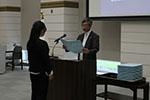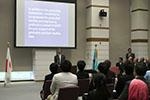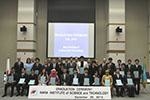2013/09/27
On Wednesday, September 25, 2013, a graduation ceremony was held in the Kenshu Hall in the Center for Frontier Science and Technology.
President Ogasawara presented degrees to each graduate and gave the congratulatory speech to the 25 graduates.
After the ceremony, the commemorative photograph was taken and the graduates enjoyed the graduation ceremony with the president, executive directors and their supervising professors.
*Number of Graduates in September
【Master's Graduates】
Information Science 8
Materials Science 1
【Doctoral Graduates】
Information Science 8
Biological Sciences 7
【Graduates who completed the Doctoral program by submitting the dissertation】
Information Science 1
【Congratulatory Remarks to Graduating Students by President OGASAWARA】
I would like to congratulate the 25 students that received their master's and doctorate degrees today. Among these graduates, there are 15 international students from 8 countries around the world. I am proud to see our international network of graduates continuing to expand. In addition to the graduates themselves, I would like to congratulate the graduates' families and express my gratitude on behalf of NAIST for your support of the graduates and their studies here. From today you will start new chapters in your lives. Master's program graduates will continue their studies or enter the workforce as talented researchers and technicians, and doctoral program graduates will join academia or begin their careers as independent researchers and technicians in industry.
First I would like to say that this is a fascinating era for science and technology, where great changes are occurring continuously. A keyword to express one of these changes is "Big Data." We are now in an era where the capacity of computers, sensors, and networks is ever-improving, the internet connects the entire world in real time, and the constructive use of various data from around the world is possible. Furthermore, through the active use of data from various sensors, we are aiming to create a new society that is richly supported by ICT technology. In the areas of biological and material sciences, previously unattainable massive amounts of data can now be acquired through innovations in observation and analysis technologies, and we anticipate the creation of new groundbreaking and dynamic biological and material fields. On the other hand, in a proposed report this month from the IPCC, a government panel concerned with weather changes, there are grave predictions that within the next 20 years the average world temperature will rise a possible 4.8 degrees and the sea level will rise as much as 81 cm. Furthermore, it is highly possible that human activities are responsible for more than half of these changes in the weather and environment, the report states. While dealing with the problems of natural resources, energy restrictions and global warming in relation to human activities, the importance of science and technology to create a sustainable society has become even clearer. It is said that there must now be a shift from a society which pursues uniform affluence and convenience to a sustainable society where varied affluence is pursued. In order to solve the future problems facing our world, new advances in science and technology must be developed by a globalized society, discarding previous models and parameters. I believe that you will be active in various fundamental areas of scientific research, developing and exploring new theories and technologies, and working in the field toward concrete solutions to the problems facing us today. One characteristic of science and technology today is the ever-closing gap between fundamental scientific results and their application in society. These two aspects of research are inseparable in their contribution to the establishment of a new society. With this in mind, I hope those who focus on scientific research will not overlook societal application, and those who focus on technological development and applied research toward solving societal problems will also pay proper attention to fundamental scientific research development.
Now I would like to talk about a different topic: the problem of fraudulent research has recently become widely discussed in Japan. One laboratory that was thought to exemplify research groups in Japan has received large amounts of highly competitive funding and has produced roughly 165 papers during a period of over 16 years. However, upon close review of these research results, it was found that 43 of these contained fraudulent data such as altered or reused images, and it has been clearly decided that rescinding these results is legitimate. Additionally, in a pharmaceutical clinical research the possible modification of research has recently led to the retraction of internationally published research. It is clear that these kinds of fraudulent acts in research must not be allowed. When thinking of why this kind of fraud occurs in research, it occurs to me that the start of this may be found in the daily activities of researchers; The results of researchers' lax attitudes in their activities may have led to large fraudulent results. As researchers, we must take full responsibility for the accuracy and reproducibility of the experiment results we make public. Collecting only data which fits your aims, or "champion data", is a mistake. Also, properly citing previous research and studies in papers you publish is an indispensible ethic for researchers.
If you look at the numbers on your degrees you will be able to see that NAIST has conferred master's degrees to 5906 students and doctoral degrees to 1167 students. As members of NAIST's growing network of graduates, I hope you will hold on to the ambitious goals and strong ethical convictions necessary to develop new science and technology toward the creation of a new society.
Heartfelt congratulations to you all.
Naotake Ogawasara
Nara Institute of Science and Technology President, September 25, 2013







